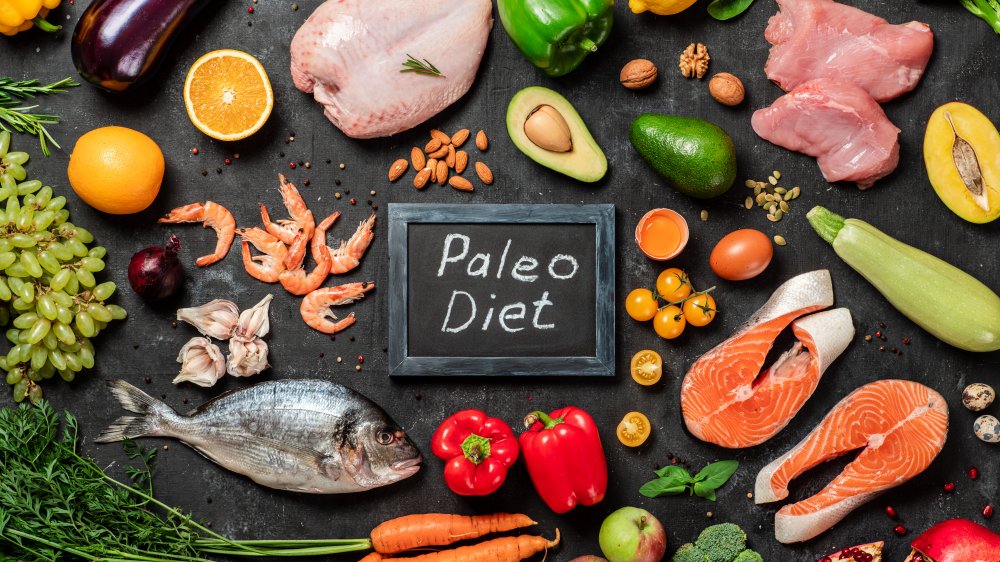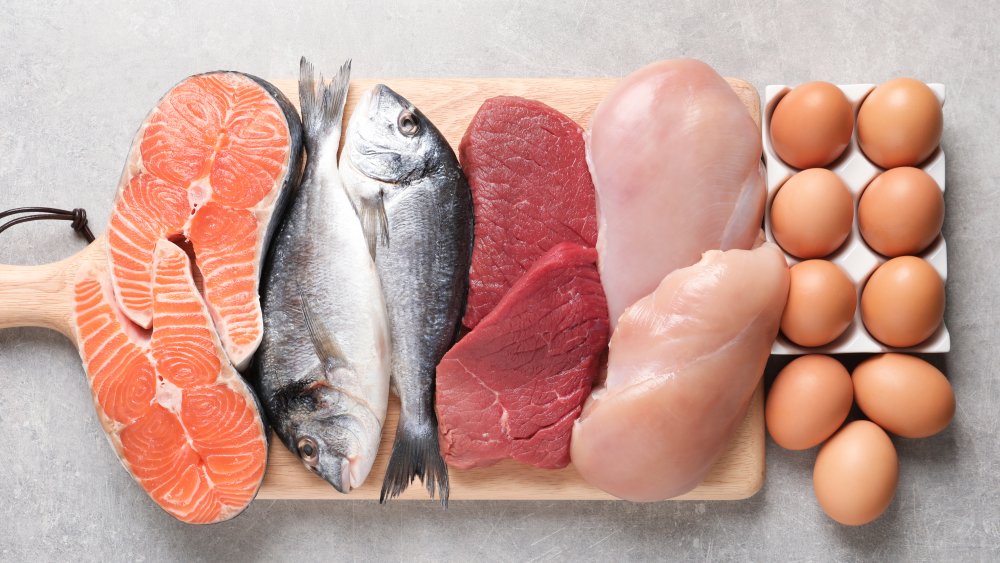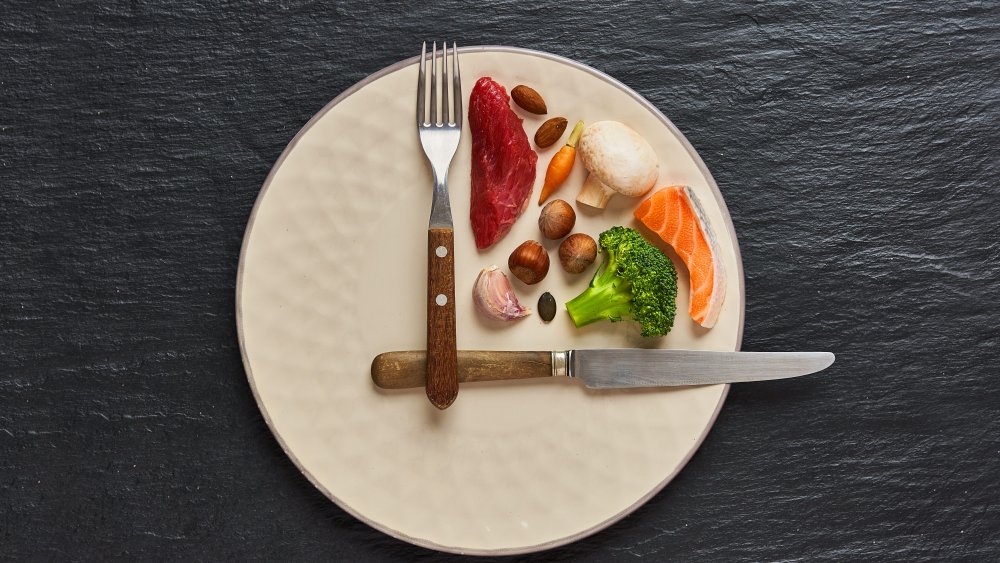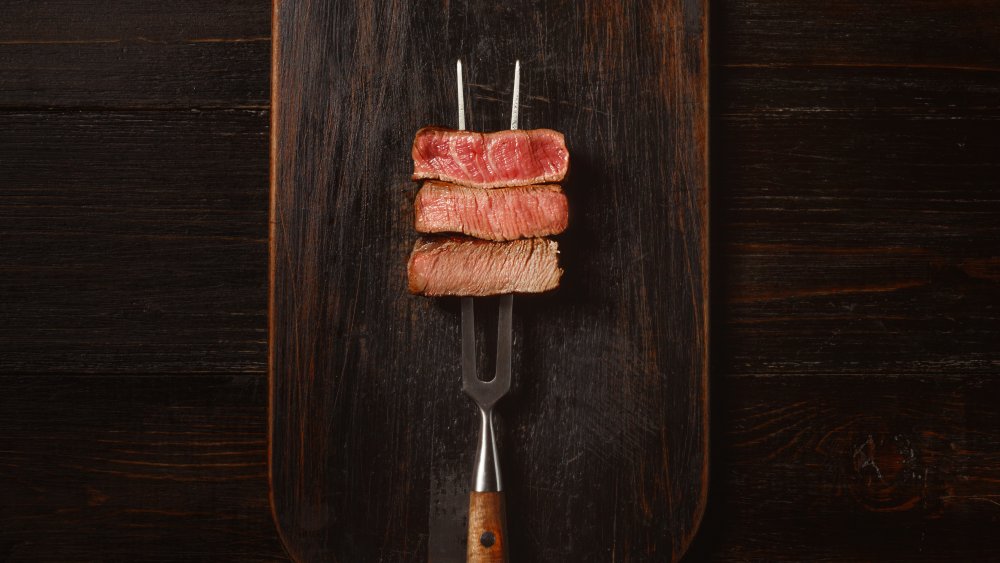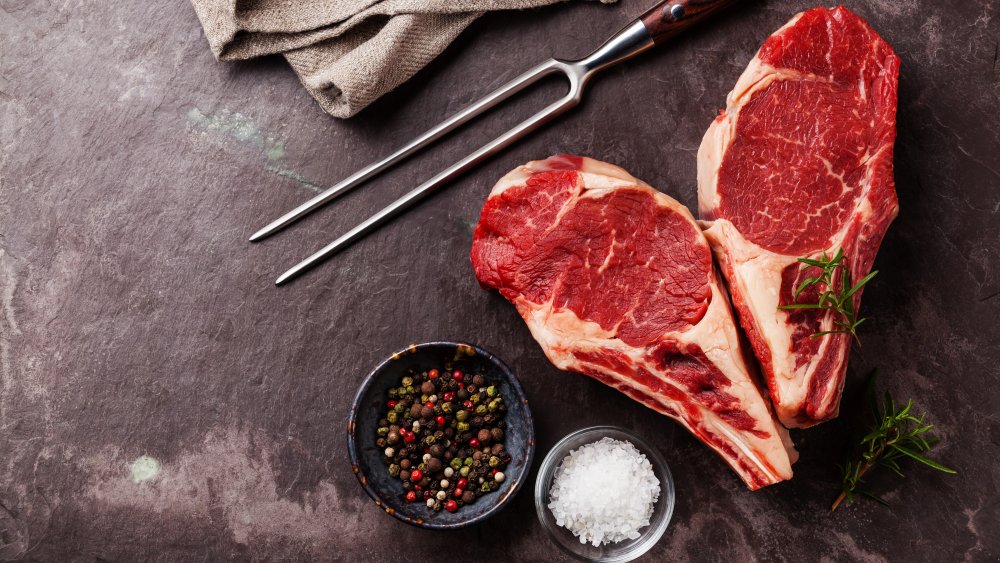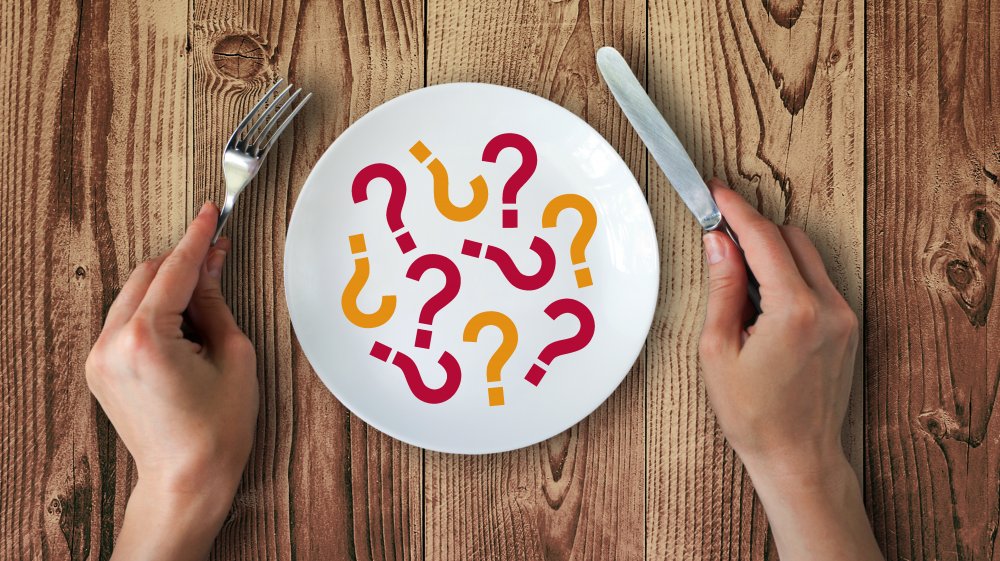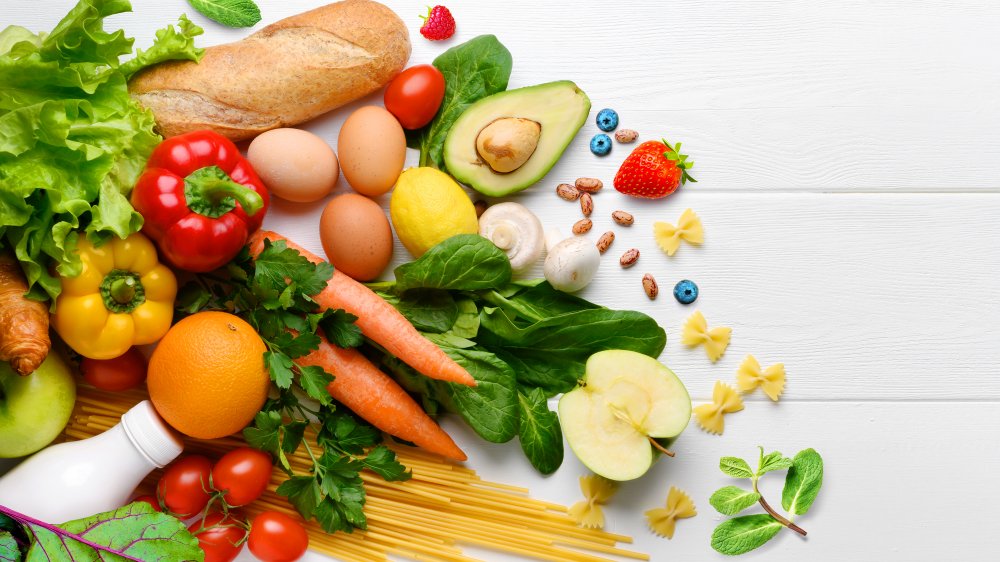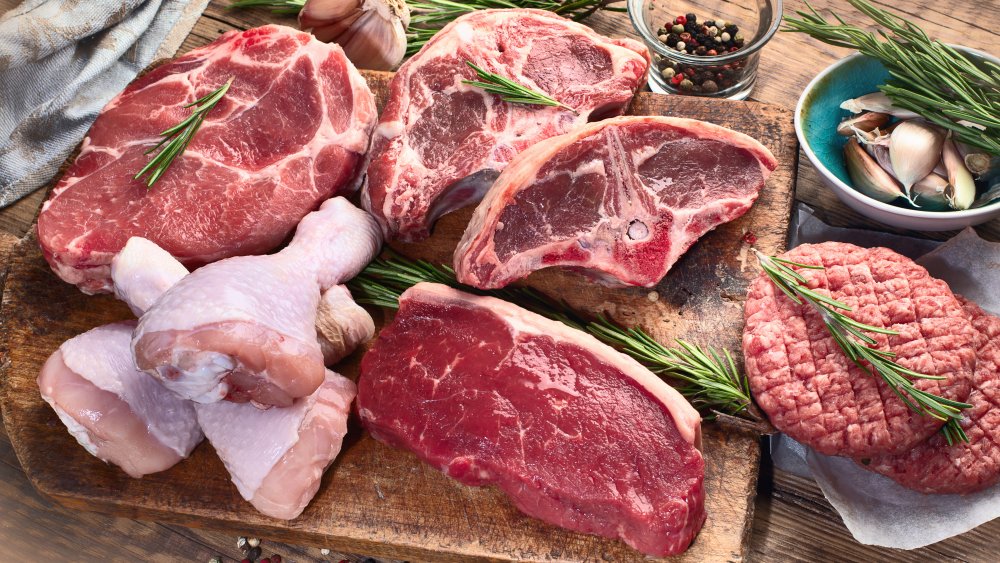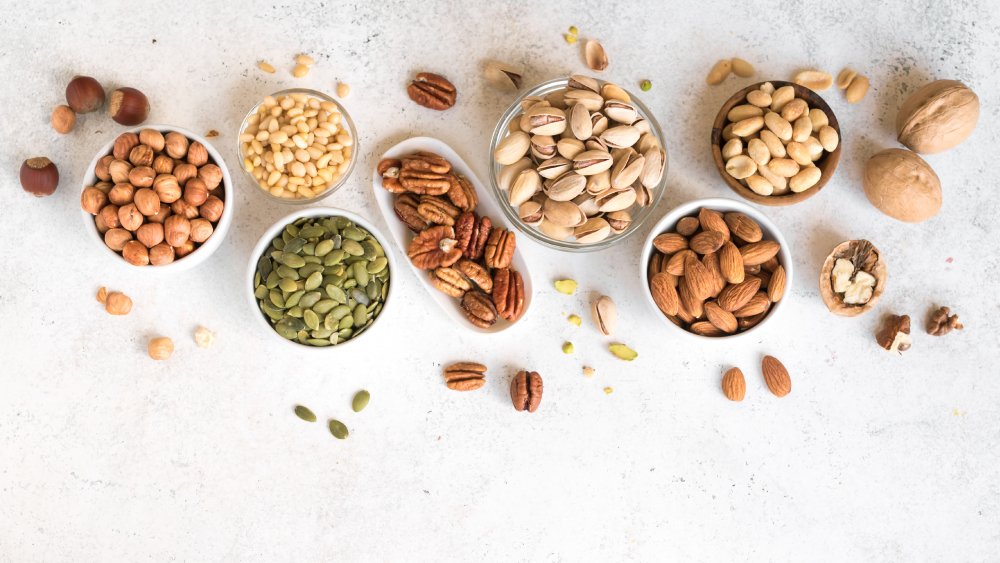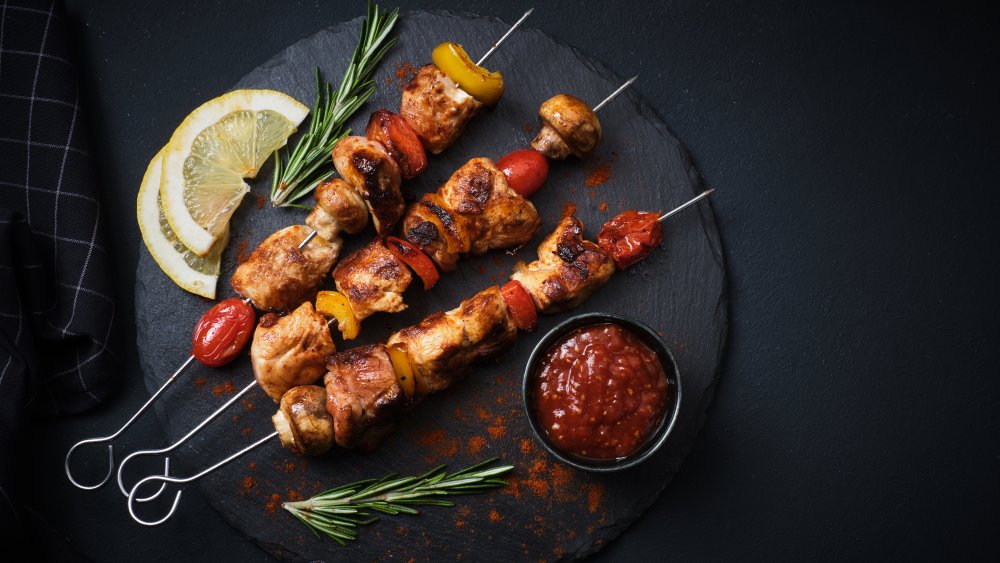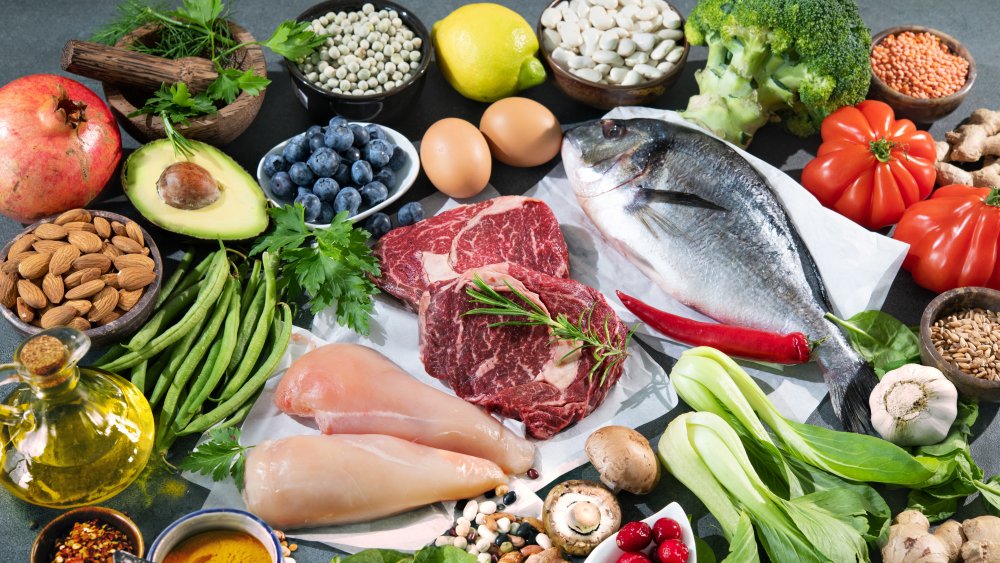When You Go On The Paleo Diet, This Is What Happens To Your Body
We may receive a commission on purchases made from links.
The paleo diet isn't exactly a new trend. The first edition of nutrition scientist Loren Cordain's book, The Paleo Diet, came out in 2002, and the diet became popular in the mainstream in the 2010s. While different people interpret the diet differently, a paleo diet generally emphasizes fruits, vegetables, nuts, seeds, and animal protein, and excludes grains, legumes, added sugars, and most dairy (via Mayo Clinic).
That said, many health experts don't hold the paleo diet in very high regard. The U.S. News & World Report ranked the paleo diet 29th out of 35 diets overall, and gave it an overall score of just 2.4 points out of 5. Their main complaint? The diet is considered too restrictive to be healthy or sustainable for most people. The experts who reviewed the diet also took issue with the all-around lack of research surrounding the paleo diet and its long-term effects on human health.
However, it is possible to make conclusions about certain aspects of the paleo diet — its low-carb nature, its emphasis on whole foods, and its exclusion of certain food groups, for example — based on the evidence around those particular diet qualities. Here's a look at what will happen to your body if you go on the paleo diet.
The high protein content of the paleo diet could help with muscle growth and repair
One of the things that makes it hard to draw conclusions about what the paleo diet does to your body is that a paleo diet could vary from person to person. Even if you're adhering to a strict paleo diet — eating fruits, vegetables, nuts, seeds, and animal proteins while avoiding grains, legumes, added sugars, and most dairy — there are no set amounts of each food that you're supposed to eat. Someone whose calories come mostly from vegetables will have different outcomes than someone whose calories come mostly from meat and fish.
However, most people on a paleo diet do eat a relatively high-protein diet, which helps the body maintain and increase lean muscle mass. A 2010 study in Medicine and Science in Sports and Exercise found that people who ate more protein maintained more muscle while losing weight than those who ate less. A later study published in Nutrients found that higher protein intake is associated with increased muscle gains when paired with regular strength training. That's good news all around, no matter what your goals are.
The paleo diet will likely lead to short-term weight loss
Although advocates of the paleo diet claim the style of eating isn't restrictive, experts disagree due to how many foods the diet excludes. And, like any restrictive diet, the paleo diet can lead to short-term weight loss.
In a two-year randomized controlled trial published in Nutrients, researchers followed 70 obese women with an average age of 60. Half of the women followed the paleo diet, while the other half followed the Nordic Nutrition Recommendations (NNR), the Swedish equivalent to the Dietary Guidelines for Americans. Both groups lost weight over the course of the study but at the six-month mark, the paleo dieters had lost significantly more fat than those following the NNR.
A 2019 review published in Nutrition Journal looked at the results of 24 previously conducted studies on the paleo diet. Here, too, the authors found that paleo dieters lost significantly more weight after six months than people on standard diets with a calorie deficit. However, they cautioned that more research must be done, with larger populations and lasting more than six months, in order to truly understand the impact of the paleo diet.
The paleo diet probably isn't better for long-term weight loss than any other diet
In a 2014 randomized controlled trial published in Nutrients, the study authors found that a group of obese women on the paleo diet lost significantly more weight after six months than those following the Nordic Nutrition Recommendations (NNR), the Swedish equivalent to the Dietary Guidelines for Americans. However, both groups lost similar amounts of weight after 24 months.
Similarly, the authors of a 2019 review published in Nutrition Journal concluded that while the paleo diet seems to be more effective than standard low-calorie diets for short-term weight loss, there's not yet evidence that they are more effective for long-term weight loss.
What' the takeaway here? As with all restrictive diets, particularly low-carb diets, the paleo diet will likely lead to short-term weight loss due to a calorie deficit and loss of water weight. However, after several months, the effectiveness of these diets becomes similar to the benefits of any low-calorie diet. So while the paleo diet could certainly lead to long-term weight loss, it isn't any better a choice than any diet.
The paleo diet could increase your risk of certain nutrient deficiencies
The paleo diet isn't restrictive in the sense that it requires you to eat fewer calories (although this often happens as a side effect). Instead, it is restrictive because it forbids you from eating certain foods — namely grains, legumes, added sugars, processed foods, and dairy products.
Cutting out added sugars and processed foods is likely a good thing. However, grains, legumes, and low-fat dairy products are recommended in the 2015-2020 Dietary Guidelines for Americans as key pillars of an overall healthy diet. Harvard Health explained that excluding important food groups can increase your risk of certain nutrient deficiencies — namely calcium, vitamin D, and B vitamins — "if these nutrients are not consistently eaten from the allowed foods or a vitamin supplement."
The article does concede that it's possible get enough calcium by choosing calcium-rich foods like leafy greens and bone-in sardines that are allowed on the paleo diet, but you'd have to eat five or more servings of these foods each day to hit the required minimum. If you do choose to go on the paleo diet, consider adding a multivitamin or other vitamin supplements to your routine.
A paleo diet rich in red meat could increase your risk of death
One recommended food on the paleo diet is grass-fed meat — that is, meat from animals that have been fed a diet of grass as opposed to grains (via The Paleo Diet). While it's true that grass-fed meat is typically lower in saturated fat and higher in heart-healthy omega-3 fatty acids than grain-fed meat, there isn't sufficient evidence to say that grass-fed meat is health-promoting (via Mayo Clinic).
A 2016 large cohort study in the Journal of the American Medical Association, which included over 131,000 people, found that people who eat meat have a higher risk of death than those who get their protein from plant sources instead. What's more, processed red meat in particular was associated with an even higher risk of death.
Of course, there are limitations to the study. It wasn't a controlled trial, which means researchers had no control over what each subject's diet looked like — daily cheeseburgers and zero vegetables is less healthy than daily lean steaks with tons of vegetables, but both diets are high in red meat. Still, most experts agree that a diet high in red meat is not optimal for health.
A paleo diet rich in red meat could increase your risk of heart disease
Although the grass-fed meat that's recommended on a paleo diet is typically lower in saturated fat and higher in heart-healthy omega-3 fatty acids than grain-fed meat, that doesn't necessarily make it any better for your heart.In fact, eating too much grass-fed red meat likely raises your risk of heart disease just as eating too much grain-fed red meat does.
A 2010 cohort study in Circulation, which included over 84,000 women between the ages of 30 and 55, found that the women who got their protein primarily from poultry, fish, and nuts had a significantly lower risk for heart disease compared to people who ate one or more servings of red meat per day.
A 2012 review published in Current Atherosclerosis Reports found that across the existing evidence, each serving of red meat per day was associated with an 18 percent increased risk of heart disease. If you do choose to try the paleo diet, be mindful of your red meat intake and try to get your protein from other sources.
Could a paleo diet help you manage your autoimmune disease?
According to Loren Cordain, nutrition scientist and the author of The Paleo Diet book and blog, a paleo diet can reduce inflammation. In turn, the diet would seemingly help prevent or manage autoimmune disease as it restricts inflammatory foods.
That sounds great, but there's not enough evidence to say for sure whether it's true. "Unfortunately, there just isn't enough scientific evidence to clearly show that following a paleo diet would be helpful for improving symptoms of an autoimmune condition," registered dietitian Kelly Kennedy told Everyday Health. "For some people, following the diet might help, but for others, it may not." She explained that while some studies do suggest benefits of a paleo diet for management of certain autoimmune diseases, these studies are small and warrant more research.
Kennedy also warned that the paleo diet "can contribute to nutrient deficiencies — something that people with autoimmune diseases are already at an increased risk of." If you have an autoimmune condition, talk to your doctor before trying any new diet or treatment.
In some cases, a paleo diet might increase your risk of diabetes
It's certainly possible to eat in a healthy way on a paleo diet by consuming a balance of fruits, vegetables, protein, nuts, and seeds. However, the lack of grains on a paleo diet has some experts worried that it could lead to an increased risk of diabetes.
In one 2019 review of three large cohort studies published in Diabetologia, the authors found that people who followed gluten-free diets for non-medical reasons (like celiac disease or gluten intolerance) were more likely to develop type 2 diabetes than those who ate gluten. However, it's important to note that the authors attribute this to gluten-free dieters eating less fiber than those who eat gluten because of a lack of whole grains. It's absolutely possible to eat adequate fiber on a paleo diet when planned correctly.
Even if a paleo diet doesn't raise your risk of diabetes, though, it's unlikely to lower it. A 2020 review in the Journal of Clinical Medicine found that, across the evidence, the paleo diet isn't associated with a lower risk of type 2 diabetes than any other diet.
Because it cuts out processed food, a paleo diet could lower your blood pressure
While many experts aren't totally on board with the paleo diet, most agree that cutting out processed food will improve your overall physical health. In particular, a diet low in or devoid of processed and fast food could help prevent or treat high blood pressure.
According to the Cleveland Clinic, eating foods lower in fat and salt can help lower blood pressure, as can using plenty of herbs, spices, vinegar, and lemon juice to flavor foods instead of salt or sugar. Processed foods are typically high in sodium (aka salt) because it adds flavor and acts as a preservative. By cutting out processed foods and eating only whole foods, you have much more control over your sodium intake. Whole foods don't come pre-salted (although most have naturally occurring sodium) so you only eat as much salt as you add to the food yourself. The Cleveland Clinic also recommends eating plenty of fiber to control blood pressure, which paleo dieters can get from fruits, vegetables, nuts, and seeds.
A paleo diet rich in fruits and vegetables could make you healthier overall
If there were a holy grail of nutrition, it would probably be a box filled with fruits and vegetables. While there's much debate in the world of nutrition — including one over whether the paleo diet is actually healthy or not! — virtually every credible expert agrees that eating the recommended five minimum servings of fruits and vegetables every day can drastically improve your health.
According to the United States Department of Agriculture (USDA), eating a diet rich in fruits and vegetables can help lower your overall calorie intake, reduce your risk of heart disease and stroke, and protect against certain types of cancers. The USDA also pointed out that different fruits and vegetables are rich in different vitamins and minerals that are essential for health, so eating a variety is the best way to get the most out of your fruit and vegetable intake. In particular, the USDA noted that fruits and vegetables deliver lots of fiber and potassium, both of which are health-promoting and lacking in many Americans' diets.
A paleo diet low in fruits and vegetables could leave you feeling constipated
While the paleo diet absolutely does encourage people to eat plenty of fruits and vegetables, some dieters may find themselves relying more heavily on meat than on produce. This could lead to all sorts of long-term health problems, but in the short term it could lead to uncomfortable constipation.
In a 2012 meta analysis published in the World Journal of Gastroenterology, researchers found that a diet high in fiber can significantly lower a person's risk of constipation. Luckily, adding more fiber to your diet can very quickly help your digestive system get moving again.
Word to the wise: If you decide to try the paleo diet, be sure to make fruits and vegetables a priority at every meal. Eating your "five a day" can not only lead to better overall health, but will also reduce your risk of uncomfortable constipation and other digestive issues. Plan meals that contain at least one or two servings of fruits and vegetables, in addition to animal protein, nuts, and seeds.
Getting most of your fats from nuts, seeds, and plants on a paleo diet could improve heart health
While the American Heart Association warns that too much saturated fat (from animal sources and coconut) could increase your risk of heart disease, they also say that unsaturated fats can have the reverse effect.
Most nutrition experts agree that the healthy fats found in nuts, seeds, fish, and other plant sources can have a protective effect on your heart health. In a 2017 report published in Circulation, the authors explained that replacing saturated fats with unsaturated ones can significantly lower your risk of heart disease (via CardioSmart).
What does this mean for paleo dieters? In a nutshell, it means that you should prioritize paleo-friendly foods high in unsaturated fats, like nuts, seeds, fish, and avocado. Try meals that use these ingredients in place of animal proteins like steak and bacon, both of which are high in saturated fats and could negatively impact your heart health if eaten too often. It's practically impossible to exclude saturated fats completely on a paleo diet, but it is possible to minimize your intake of these fats by replacing them with unsaturated fats.
Eating lots of meat on a paleo diet could increase your cancer risk
More and more nutrition experts have begun to recommend shifting to a more plant-based diet. And, for good reason. "Plant-based diets have been associated with reduced risk of certain cancers, high blood pressure, high cholesterol, and hyperglycemia, as well as lower body fat and body mass index," registered dietitian Julieanna Heaver told Everyday Health.
However, the paleo diet, with its emphasis on meat and seafood, is decidedly not plant-based. While it's definitely possible to eat plenty of fruits and vegetables on a paleo diet, there's no denying that paleo dieters will also eat a lot of animal protein.
In a 2015 review published in Critical Reviews in Oncology/Hematology, the authors found that people who consume large amounts of red or processed meat have a higher risk of cancer than those who do not. But, there's a silver lining. People who had a high intake of white meat and poultry did not have an increased risk of cancer.
Eating a paleo diet is unlikely to decrease inflammation in your body
Loren Cordain, nutrition scientist and author of The Paleo Diet book and blog, claims that the paleo diet can reduce inflammation in your body by eliminating foods that most commonly cause inflammation. However, this isn't necessarily the case.
According to Brian St. Pierre, registered dietitian and founder of Precision Nutrition, the link between food and inflammation is complicated. Paleo advocates claim that legumes can cause inflammation due to phytates and lectins, two chemical compounds. However, St. Pierre explained that the small amounts of these compounds in foods is pretty inconsequential unless you're eating only grains and legumes all day long.
Similarly, the dietitian explained that the gluten found in wheat and other grains is only inflammatory for people with celiac disease (a well-studied autoimmune condition) or gluten sensitivity (a lesser-understood condition that doesn't have any clear diagnostic indicators). In fact, while processed grains have been shown to increase inflammation, whole grains have been shown to decrease inflammation. If you're eating a paleo diet in the hopes of reducing inflammation, you're probably better off just cutting out processed foods.

